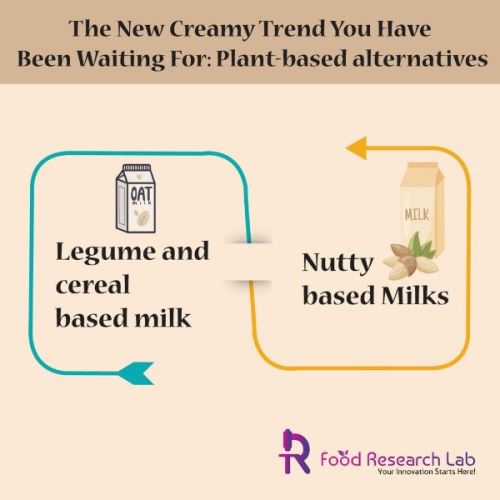Dairy products are a staple in several people’s diets. From making the coffee creamer to cooking the most classic recipes, milk is utilized in every meal of the day. One cup of cow’s milk (240 mL) contains 8 grams of protein, 8 grams of fat, and 13 grams of carbohydrates, providing a total of 146 calories in total (1). Dairy is used as a stabilizer in baking, to richen sauces and soups, and to make delicious, sweet desserts. Dairy is used in nearly every regional cuisine around the globe.
New creamy trend you have been waiting for plant based alternatives
Introduction
Dairy products are a staple in several people’s diets. From making the coffee creamer to cooking the most classic recipes, milk is utilized in every meal of the day. One cup of cow’s milk (240 mL) contains 8 grams of protein, 8 grams of fat, and 13 grams of carbohydrates, providing a total of 146 calories in total (1). Dairy is used as a stabilizer in baking, to richen sauces and soups, and to make delicious, sweet desserts. Dairy is used in nearly every regional cuisine around the globe.
While it is a popular choice for many, some individuals can’t consume dairy items due to personal or practical reasons, such as dietary restrictions, allergies or intolerances and moral reasons. Therefore, at Food Research Lab, our food and nutraceuticals product development scientists have been finding alternatives to satisfy our dairy dependency for centuries. Plant-based products can be used as an alternative to mimic the flavor, nutrition and cooking science of dairy products. Moreover, these plant-based alternatives serve as an extraordinary solution for individuals with diet restrictions and intolerances. For people trying to lose weight, lactose intolerant or choose to eliminate animal products from your lifestyle, these non-dairy products provide the same or similar benefits of milk. (2)
Today, a diverse food trend is observed across the globe, which has introduced exciting alternatives such as hemp, quinoa etc. We can generally classify plant-based milk alternatives into five categories as follows.
- Formulation based on Cereals: Oat milk, Rice milk, Corn milk, Spelt milk.
- Legume based new food product development: Soy milk, Peanut milk, Lupin milk, Cowpea milk.
- Nut based food and drink product development: Almond milk, Coconut milk, Hazelnut milk, Pistachio milk, Walnut milk.
- Seed based product development: Sesame milk, Flax milk, Hemp milk, Sunflower milk.
- Pseudo-cereal based product development: Quinoa milk, Teff milk, Amaranth milk.
Market Research Future reported that the plant-based products in the US grew 61 % in 6 years, reaching US$ 2.3 billion. This global trend is expected to surpass a whopping US$ 2.7 billion by 2022. In 2017, Almond milk owned 64% of sales, followed by soy and coconut milk, accounting for the total quarter of the market shares. Oat milk has gained increased attention in the last few years as it has grown 23 % from 2017 to 2018, while the other blends in total have grown by 51%. Niche dairy alternatives such as cashew and help make up the remaining 11 % of the market shares. Let us dig into a few key plant-based alternatives. (3)
The Nutty Milks
The milk from almonds, macadamia, cashews and coconut are extracted from whole nuts.
Almond milk is a great alternative due to its low sugar content and milk flavor, making it an excellent low calorie and low carb alternative. One cup of unsweetened almond milk contains 1 gm of protein, 2.5 grams of fat and 2 grams of carbohydrate providing a total calorie content of 30–35.
Formulation based on almond milk is rich in Vitamin E fighting the free radicals, high in fiber and healthy fats. Almond also contain Phytic acid, which reduces the absorption of iron, zinc and calcium in the body. (4)
Macadamia is fairly new to the market and most brands are made in Australia. Macadamia milk is high in healthy monounsaturated fats, which aids in reducing blood cholesterol, blood pressures and the risk of heart disease. It has a richer and creamier flavor and tastes great in smoothies or coffee. One cup contains 1-5 grams of protein, 5 grams of fat and 1 gram of carbohydrates making up to 55 calories, a great option for people trying to reduce their calorie intake. (5)
Cashews are known for their thick creamy texture and sweet nutty flavor. It is one wonderful alternative in making smoothies, as a creamer in coffee and desserts. One cup of unsweetened milk contains 1 gram of protein, 2 to 4 grams of fat, and 1 to 2 grams of carbohydrates making up to 50 calories. Individuals with low protein requirement might opt of cashew milk which is also a low-calorie option. (6)
Coconut milk extracted from the white flesh of the brown coconuts has a creamy texture and a sweet flavor. One cup contains 4 grams of fat with little or no protein and carbs constituting up to 45 calories. Around 90% of the calories are due to the saturated fat including medium-chain triglycerides (MCT). Several studies suggest that MCT might help to reduce appetite and assist with weight reduction. Overall, it may be the best option for individuals looking to reduce carb intake.
You can treat yourself and your kids with a rich Coconut yogurt at home. Simply add whole fat coconut milk and a probiotic, to make a thick creamy yogurt. (7)
Formulation of Legume and cereal based milk imitations
New product formulation based on legume and cereal-based beverages are made from hydrating high starchy grains and then the excess water is removed by heating them in the presence of water and amylase. A controlled pH setting is used for the slurry, to reduce the starch content and to remove insoluble fiber and suspended soluble fiber. Therefore, to make a stable emulsion, thickeners, stabilizers such as gums and vegetable oils are also added to improve taste and consistency. (8)

Soymilk formulation, the most commonly used alternative is extracted from the whole soybeans or from the soy protein isolate. Soy milk is one of the few plant-based alternatives which offers a completed protein source offering all essential amino acids that cannot be produced in the body (9). It has a mild and creamy flavor. One cup of unsweetened milk contains 7 to 9 grams of protein, 4 grams of fat and carbohydrates providing a total of 80 to 90 calories.
Soy milk is rich in digestible calcium, Vitamin A, E, B and a good amount of iron. They are also low in saturated fat and cholesterol. Soy milk also contains large amounts of isoflavones which can affect the estrogen receptors and affect hormone functions.
Restaurant consulting services reduce the risk of buying the old goods from the supply chain buyers, by reducing the chance to have two or three parties in between the process. to build a new innovative product that will attract the audience for sure—at the same time, planning to give an authentic product list out the number of ingredients needed including the data of the company, for example how they store, deliver their products to the restaurants in order to check the product’s value and also to get an innovative outcome.
Oat and rice milk formulations have found a tremendous place on the supermarket shelves. It has the most satisfying flavor with a creamy texture that replicates the richness of cow’s milk. Oat milks are rich in sugar and vitamin B12 content and contain a good source of fiber and beta-glucan, which forms a thick gel as it passes through the gut. The beta-glucan gel binds to cholesterol, reducing the overall absorption in the body.
One cup of oat milk contains 2 to 5 grams of protein, 5 grams of fat and 20 to 30 grams of carbs, amounting to a total of 140 to 170 calories. It has a low glycemic index and a high content of folic acid which is essential for pregnant and lactating women.
Rice milk is extracted from filtering rice cooked in water. During this process, carbs becoming sugar giving a sweet taste to the drink. Rice milk is the least allergenic alternative and the safest option for individuals with allergies and intolerance to dairy, gluten or nuts. One cup of rice milk contains 1 gram of protein, 2 to 3 grams of fat and 27 to 38 grams of carbohydrates, providing 130 to 140 calories. Majorly, it contains polyunsaturated fats, vitamins A, B. D, minerals and soluble fiber. (10)
Rice milk offers a high glycemic index (GI) of 79 to 92, which makes it a quickly digestible and rapid increase in blood sugar levels. It has a low protein content and high levels of inorganic arsenic chemical found naturally in the environment (11, 12). For these reasons, it may not be the best option for people with diabetes. However, for most individuals, consuming rice milk should not cause concern.
Due to these new plant-based milk alternatives, a whole range of health food market is expanded, developing a complete nutritional food with high acceptability. While less than 10% of consumers are identified as Vegans, a growing number of customers are moving towards flexitarian eating habits. This shift in consumerism has shed light on plant-based ingredients across a multitude of product categories. Plant Based Food Association (PBFA) reported that the sale of plant-based foods grew by a whopping 20% reaching a total of $3.3 billion indicating plant base ingredients are no longer just a niche market.
Formulating a new product involves various challenges, as a cross-functional team is required, such as marketing, regulatory affairs and quality assurance. Moreover, companies or industries also have to keep up with the rapidly evolving food trends.
Firstly, it can be a challenge to calculate the direct cost of all the ingredients to the manufacturing, as there is no proper process in place. Often the company’s marketing department will determine the maximum price that the consumers are willing to pay for a product in that category. Secondly, when creating new products, scientists need to be aware of various allergens prohibited by your local regulatory body. Allergens present in the final product will be declared on the packaging label. Nutritional information and product claims (such as non-fat, reduced sugar etc.) used on the packaging label should follow strict compliance and needs to be accurate. (13)
We have the experience, knowledge and ingredients portfolio to help you develop
Interested in learn more? Get in touch, we’d love to discuss your next project with you
About Food Research Lab
With many years of passion and experience in the industry, Food Research Lab serves as a one-stop solution for all your food business needs, from creating a new product or enhance an existing one. Our food technology experts will help you through a plethora of rules and regulations across the globe, to enable your product (food & nutraceuticals/supplements) to reach customers hands promptly. By working directly with us, you’re assured of getting a dynamic, innovative product of your specifications. We will also help you with a cost analysis of new product for your specification and certification process of your product. Reach us at [email protected]
Dr Raj is a trained food scientist from New Zealand, with 10 years of experience. Upon completion of his PhD, he worked for various FMCGs. He is the recipient of the Oxoid food science award from the Heriot-Watt University and Callaghan grant from University of Otago and Callaghan Innovations for his academic performance. Raj writes early in the morning, then spends the rest of the day working as a full-time technologist and as a consultant at Food Research Lab, Chennai & the UK, where he makes his experiments work.

Let’s create something Innovative and Delicious together
Food Research Lab strives for excellence in new Food, Beverage and Nutraceutical Product Research and Development by offering cutting edge scientific analysis and expertise.




